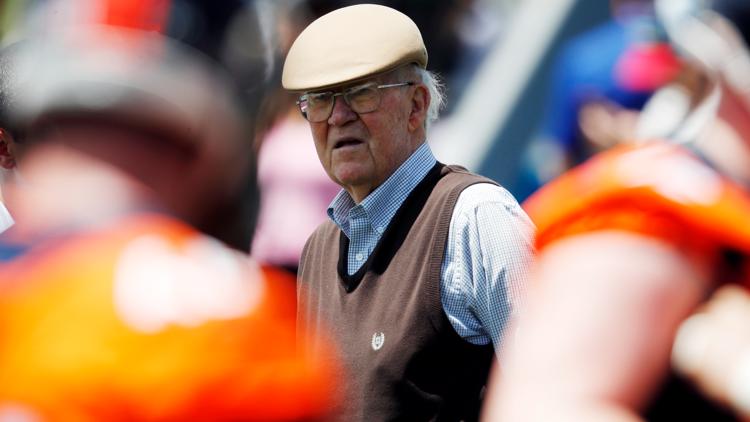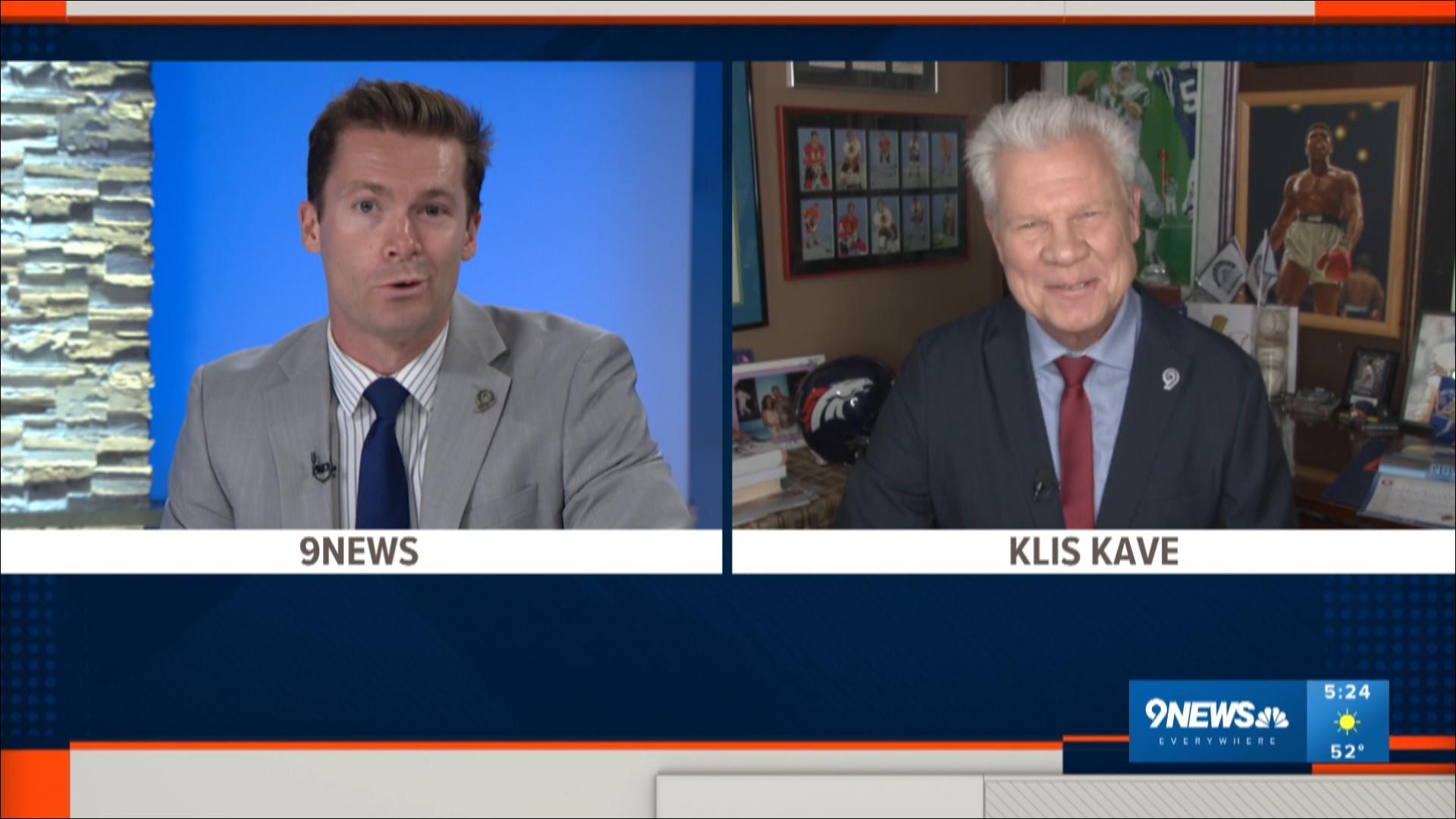ENGLEWOOD, Colo — Joe Collier, the architect of the famed Orange Crush defense and arguably one of the best defensive coordinators in NFL history, has died.
He was 91.
"We lost a good man,'' said former Broncos' cornerback and safety Steve Foley, the franchise's all-time interception leader with 44. "He treated us with total respect. I never heard him yell at a guy. In 11 years, I never heard him yell at a guy.
"He’s responsible for everything I’ve achieved, taking me from quarterback to defense -- I’ve got nothing but love for Joe Collier. He was like a second father.”
“I found out that Joe passed a little bit earlier today. Joe and I just had that unique player-coach relationship,'' said Randy Gradishar, the leading tackler on those Orange Crush teams who was recently elected into the Pro Football Hall of Fame. "Just had a tremendous amount of respect for him.
"Finding out he had passed has been a very difficult, hard day for me. Just having those memories of Joe on the sideline, signaling me the defensive calls and the way he acted in practice. It was always in a very encouraging way.''
Collier first gained recognition as a top defensive coach while as an assistant for Lou Saban with the American Football League champion Buffalo Bills in 1965. When Saban decided he needed another challenge, Collier became the Bills' head coach in 1966, posting a 9-4-1 record before losing to the Kansas City Chiefs in the AFL Championship Game.
He was fired two games into the 1968 season, which opened up a 20-year opportunity with the Broncos from 1969-88, the last 17 years of which were as the team’s defensive coordinator.
“Every guy that played for him, especially those Orange Crush teams, we’d run through a brick wall for Joe,'' Foley said. "If Joe said, 'Hey guys, I want you to run through that brick wall,' we’d line up and run right through it. We had that much confidence and love for Joe that we would do anything he asked.''
When Broncos’ star defensive end Lyle Alzado suffered a season-ending injury in the 1976 opener, Collier eventually transitioned that year from the 4-3 defensive alignment that was customary throughout the NFL to the 3-4. The reason was simple: Collier believed he had more good linebackers than defensive linemen.
“Joe was an incredible thinker and creator,'' Foley said. "He worked with what he had and if we had more linebackers than defensive linemen that’s when we went to the 3-4. We had Rubin Carter at noseguard who demanded a double-team every single play. And so that set up the defense.
“I saw him do more things with people who became great, like Karl Mecklenburg and Simon Fletcher. Those were defensive linemen that he stood up. He was the first defensive coordinator to do that. He just had an eye for talent and a discipline.''
Mecklenburg was selected by the Broncos out of the University of Minnesota as a noseguard in the 12th round of the 1983 NFL Draft.
"Two-hundred, forty-pound noseguards don't make it in the NFL,'' Mecklenburg said. "Unless they play for Joe."
Soft-spoken and humble with a football intellict so extraordinary, one of his former assistants Bill Belichick gushed praised towards Collier over the years, Collier shifted Carter over to playing across the center. He moved Paul Smith to right defensive end and Barney Chavous to left defensive end. The four linebackers were Tom Jackson, Randy Gradishar, Bob Swenson and Joe Rizzo. The secondary boasted Billy Thompson and John Roswer at safety and Louis Wright and Steve Foley at cornerback.
"Genius. Most people don’t know that Bill Belichick started off with us,'' Jackson said of Collier in the book, The 50 Greatest Players in Denver Broncos History. "You look at the techniques that they use now, it’s exactly what Joe Collier taught. Contact at the line of scrimmage, nobody gets a free release uncontested.
"The bump rule, I always tell people, 1977 we went to the Super Bowl and in the offseason when we met with the referees before the '78 season, they had changed the bump rule. You could no longer bump people all over the field. You could only bump them to 5 yards. That came out of the Orange Crush.’’
Belichick, who later as head coach led New England to 9 Super Bowls, winning six, was a defensive assistant for Collier in Denver in 1978.
“You know Bill, when I was younger with the Broncos, Bill Belicichik was following Joe Collier around with a clipboard,'' Foley said. "And he got to watch Joe gameplan – and Bill in his own right was a really bright guy and picked up on Joe Collier’s philosophies.
"What he really wanted to do was take away the best players on the other team’s offense and make them beat us with inferior players. Like (Chargers' tight end) Kellen Winslow, we were not going to let him run around and do what he wanted. We were going to double-team him and make sure they had to go to other receivers that couldn’t kill you.”
Alzado returned in 1977 and Bernard Jackson replaced Roswer at free safety. The Broncos went 12-2 and beat the Steelers and Raiders in back-to-back playoff weeks to earn the team’s first-ever trip to the Super Bowl. The Orange Crush defense allowed just 10.6 points per game that season and received the bulk of the credit for that magical 1977 season.
“At that time it was Bill Arnsburger (the Dolphins defensive coordinator) and Joe Collier,'' Foley said. "They were the two best defensive coaches. Joe was inventing all these defenses and putting stuff in that we had never seen anybody do."
When head coach Red Miller -- despite three playoff appearances and no losing seasons in his four years at the helm-- was fired by new owner Edgar Kaiser Jr. after the 1980 season, Collier stayed on as defensive coordinator for new head coach Dan Reeves.
Collier was the Broncos’ top defensive coach in 1986-87 when the team won its second and third AFC Championships and made back-to-back Super Bowl appearances.
Collier was fired after an 8-8 season in 1988 even the Broncos ranked in the top 10 in either scoring or total defense, or both in 11 of his 17 seasons as coordinator. He was elected into the Colorado Sports Hall of Fame in 2002. Collier later spent two more years as the New England Patriots’ defensive coordinator in 1991-92 before retiring from coaching.
After his coaching career, Collier served on the Broncos’ Ring of Fame selection committee for more than 20 years. Among his survivors are his three children, Joel, Julie and Lisa.
“He taught me something about coaching, even when I did some volunteer coaching,'' Foley said. "That guy demanded the utmost respect yet he never browbeat one person. I never saw him do it.”
Said Gradishar: “He was a humble guy. I don’t remember Joe being upset. I didn’t see those emotions very much. He was always encouraging. I remember some coaches who would get in your face, very, very angry and yell at you kind of thing but Joe never did. It was almost like his strategy. He was always a very positive, move ahead.”
Said Mecklenburg: "What an amazing guy. The defenses you see nowadays when somebody plays inside and outside, I mean Joe was doing that before I got here. Joe had Dennis Smith do all kinds of stuff that other safeties wouldn't do.
"For me the definition of leadership is knowing you're people and putting them in positions to be successful. Figure out what you could do and what you couldn't. He would cover up for you on the stuff you couldn't do and use what you could do. What a great coach."


SUGGESTED VIDEOS: Sports



